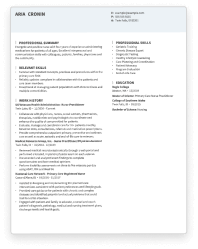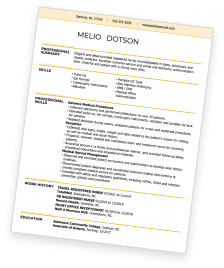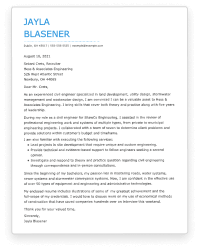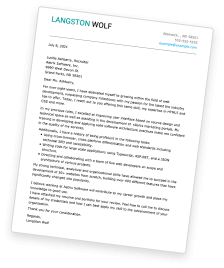Optometrist Resumes: Overview
Optometrists play a crucial role in the healthcare industry by diagnosing and treating various eye conditions, prescribing eyeglasses or contact lenses, and providing essential eye care. They conduct eye exams, diagnose and treat visual problems, prescribe corrective lenses, and advise patients on eye health.
Optometrists can be found in various work settings, including:
- Independent optometry practices.
- Chain optical stores.
- Hospitals and healthcare facilities.
- Research and development organizations.
To excel in this profession, optometrists should possess a strong foundation of knowledge in optics and eye disease, physiology, excellent communication skills, attention to detail, and a commitment to providing exceptional patient care.
Ready to create your resume? Whether you’re an experienced optometrist or just beginning your career, we have the resources you need to craft a resume that stands out to potential employers. Explore our resume examples and downloadable templates to get started!
Senior Optometrist Resume Example
This resume example for an optometrist demonstrates an ideal balance between design and content, making it a strong fit for optometrist applicants. This resume template stands out for several reasons:
- Visually Appealing Design: This resume example has a professional layout and is easy to read. Its subtle use of color, and clearly labeled sections catch the reader’s eye and will appeal to potential employers.
- Concise Content: The resume efficiently presents the candidate’s skills, experience, and qualifications without overwhelming the reader. The chronological work history allows the candidate to detail their career progression, while the skills section uses two columns to display an impressive list of abilities.
- Professional Summary: The professional summary effectively summarizes the candidate’s expertise and what they bring to the role. The writing is brief but persuasive, using personal qualities and hard and soft skills to highlight the candidate’s qualifications.
- Detailed Work Experience: The work experience section details the candidate’s optometry-related responsibilities. It also quantifies the optometrist’s accomplishments by using numbers and percentages.
Crafting a resume like this one will make a great first impression and increase your chances of landing your desired optometry position!
Optometrist Resume Sample
This example resume showcases a thoughtful blend of style and professionalism, making it an excellent choice for an optometrist. This resume is impressive for several reasons:
- Combination Format: Using a combination resume emphasizes the candidate’s impressive list of skills, followed by their work history and education. It is well-organized with clear headings, making it easy for employers to navigate.
- Professional Summary: The candidate’s professional summary provides a snapshot of the candidate’s optometry experience and skills. It demonstrates the optometrist’s impact by using numbers to illustrate the number of patients they have cared for.
- Aesthetic Appeal: The design is visually engaging without being overly complex. Using color and unique graphic elements makes it stand out from other resumes.
- Comprehensive Work History: The work history section offers a detailed account of the candidate’s optometry roles. Each bullet is concise but informative and uses numbers to validate the optometrist’s experience.
By creating a resume that follows this example’s structure and style, you can effectively highlight your optometry expertise and increase your chances of securing your desired role. Use this resume as a guide, or use one of our expertly designed resume templates to save time.
How to Write an Optometrist Resume
Writing a compelling optometrist resume involves several key components. Here’s a step-by-step guide to writing a resume that will catch the attention of potential employers:
Pick a Format:
Choose a resume format that suits your career history. Opt for a chronological format to emphasize your work experience, a functional structure to highlight your skills, or a combination format to balance both.
Contact Information:
Include your full name, contact number, email address, and location in your resume header. Make sure your contact information is current and professional.
Resume Summary or Objective:
Craft a concise summary or objective that showcases your optometry expertise and what you bring to the table. Tailor this section to the specific job you’re applying for. Using keywords from the job description can help your resume pass initial screenings by applicant tracking systems and hiring managers.
Work History:
Detail your relevant work experience, starting with your most recent position. Highlight key accomplishments and responsibilities, emphasizing your expertise in optometry. Quantify your achievements when possible to validate your qualifications. For example, “Tested over 30 patients daily for visual acuity, depth, color perception, and ability to focus and coordinate the eyes.
Skills:
Create a dedicated section for your optometry-related skills, such as eye examinations, contact lens fitting, and patient care. Also include soft skills like decision-making, communication and compassion to demonstrate your ability to care for patients.
Education:
List your educational qualifications, including your optometry degree, university, and graduation date.
Additional Sections:
Include other sections that can bolster your resume, such as certifications, licenses, or professional affiliations.
Key Skills and Certifications For Optometrist Resumes
To stand out in the competitive field of optometry, you should possess a mix of hard and soft skills, along with relevant certifications. Here are the top five hard skills, soft skills and certifications an optometrist needs to succeed.
Top 5 Hard Skills for Optometrists
- Eye Examination: Proficiency in conducting thorough eye examinations, assessing visual acuity, and diagnosing eye conditions is essential to any optometrist.
- Contact Lens Fitting: Expertise in fitting, prescribing, and educating patients on contact lenses is necessary for today’s optometry practices.
- Ocular Disease Management: Successful optometrists must be able to diagnose and manage ocular diseases and conditions, including glaucoma, cataracts, and macular degeneration.
- Prescription Management: Mention your experience prescribing and dispensing eyeglasses and contact lenses and ensuring proper patient vision correction to demonstrate your qualifications for the job.
- Ophthalmic Business Management: This sought-after skill demonstrates your knowledge of operating an efficient and profitable practice.
Top 5 Soft Skills for Optometrists
- Communication: Effective communication with patients is an essential skill for an optometrist. Part of excellent patient care is explaining diagnoses and treatment plans clearly.
- Empathy: The ability to understand and address patients’ concerns and emotions demonstrates commitment to patient care and dedication to excellence.
- Attention to Detail: A keen eye for detail in diagnosing and prescribing vision correction is a must for an optometrist.
- Problem-Solving: Optometrists must solve patient issues quickly and effectively. They need excellent reasoning skills to diagnose eye conditions and formulate appropriate treatment plans.
- Adaptability: This soft skill illustrates your willingness to stay updated with the latest optometry technologies and treatments. It also demonstrates your ability to handle shifting priorities and patient emergencies.
Top 5 Certifications for Optometrists
- Doctor of Optometry (O.D.): Becoming an optometrist requires a Doctor of Optometry degree from an accredited O.D. program.
- State Licensure: Optometrists must obtain a state-specific optometry license to practice legally. Listing your state license number will demonstrate your qualifications for the job.
- Board Certification: Board certification from organizations like the American Board of Opticianry demonstrates advanced expertise and commitment to learning.
- Therapeutic Pharmaceutical Agents (TPA) Certification: This certification is required in some states to allow an optometrist to prescribe therapeutic medications.
- Contact Lens Certification: Certification in fitting and prescribing contact lenses for patients is a requirement for practice in several states. A certification from the NCLE demonstrates you have the knowledge and skills needed in your profession.
Helping Job Seekers Like You
7 Tips For Writing an Optometrist Resume
- Tailor Your Resume: Customize your resume for each job application, emphasizing skills and experience relevant to the specific role. Use keywords from the job description to illustrate your alignment with the job.
- Highlight Accomplishments: In your work history, focus on quantifiable achievements, such as the number of patients seen or improved patient satisfaction scores. For example, “worked closely with patients in vision therapy and follow-up appointments to improve patient satisfaction by 50%.”
- Use Action Verbs: Begin bullet points with strong action verbs, such as “diagnosed,” “prescribed,” or “managed,” to make your responsibilities more impactful. Using powerful verbs will engage the reader and make a positive impression.
- Professional Summary: Craft a professional summary that immediately showcases your expertise and why you’re an excellent fit for the position. A great summary is persuasive and concise, so it should be 2 or 3 sentences maximum.
- Include Continuing Education: Highlight any ongoing education or certifications you’ve obtained to demonstrate your commitment to professional development. It also lets potential employers know that you are up-to-date on the current advances in the field of optometry.
- Proofread Thoroughly: Eliminate errors and typos, as attention to detail is a crucial skill in optometry. Double-check your spelling, grammar and punctuation; even a tiny mistake can create a poor first impression.
- Stay Concise: Keep your resume concise and focused on the most relevant information, ensuring that it’s easy for employers to skim. Typically, an optometrist’s resume should be one page long. If you have an extensive work history, it is okay to include a second page.


Save Time With Hloom's Resume Builder
Key Takeaways
- Optometrists play a vital role in eye care, diagnosing and treating various eye conditions, and prescribing corrective lenses.
- Your optometrist resume should effectively showcase your expertise, skills, and qualifications to attract potential employers.
- Highlight hard skills like eye exams and patient care and soft skills like communication and empathy to demonstrate your qualifications.
- Include relevant certifications, such as an O.D. and state licensure, to add credibility to your resume.
- Tailor your resume to the specific job by emphasizing skills and experience most relevant to the job description.
Save Time With Hloom's Cover Letter Builder









